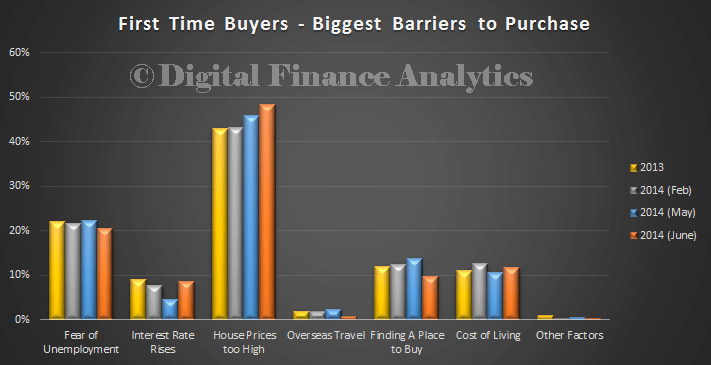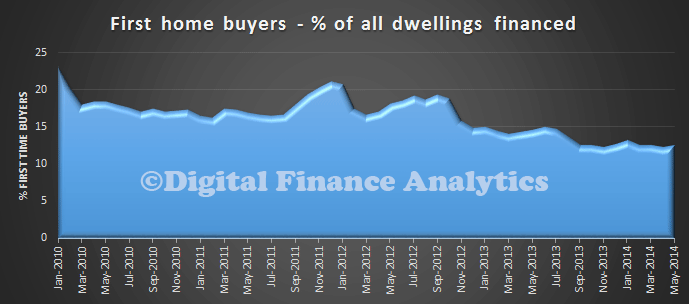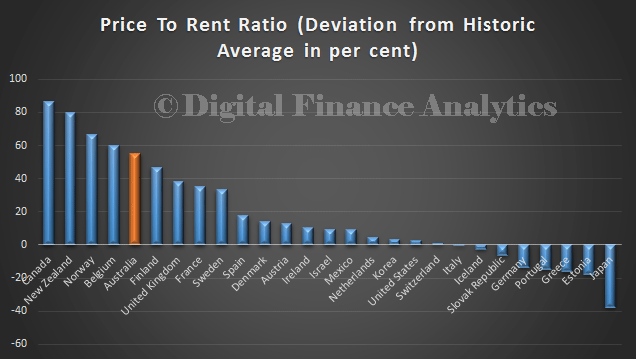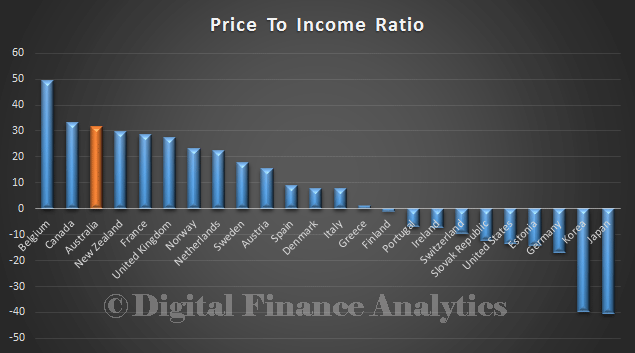We know that first time buyers are sitting on the sidelines, as shown in our recent surveys. The biggest barrier is price. Many are desperate to enter the market and would jump at any additional incentive.
 No surprise then to see proposals popping up from time to time to try and assist first time buyers. Often they are tactical and shorted sighted. The latest is from Nick Xenaphon, the Independent Senator for South Australia “Home affordability: a Super idea“.
No surprise then to see proposals popping up from time to time to try and assist first time buyers. Often they are tactical and shorted sighted. The latest is from Nick Xenaphon, the Independent Senator for South Australia “Home affordability: a Super idea“.
Independent Senator for South Australia, Nick Xenophon, will introduce legislative changes in the Spring session of parliament to allow first home buyers to access their superannuation savings to pay a house deposit. Such a scheme successfully operates in Canada, called Home Buyers’ Plan, leading to improved housing affordability. At a Senate Economics References Committee hearing in Adelaide today, the Inquiry heard from HomeStart Finance (an arm of the South Australian Government) outlining the Canadian scheme. In Canada up to $25,000 can be accessed for a first home, and it’s made a dramatic difference for housing affordability there. However, Senator Xenophon will be moving for changes to Superannuation Act 1976 to allow the release to superannuation funds for a first home, with similar safeguards to the Canadian scheme. In Canada the amount has to be paid back into the super fund within 15 years. “With more and more Australians finding it difficult to break into home ownership, adopting the Canadian scheme would make a difference to many thousands of Australians each year,” Nick said. “As HomeStart Finance said today, there’s something strange about being able to access your super fund if you are about to default on your housing loan, but you can’t access it to put a deposit on a home in the first place.” Housing affordability in Australia has fallen for the past three decades, as house prices outstrip income growth. An annual affordability survey by Demographia this year found Australia had the second-worst housing affordability in the world, behind Hong Kong. All 39 Australian housing markets surveyed were “seriously” or “severely” unaffordable, defined as having average house prices more than four times average income. Senator Xenophon gave credit to his state colleague, John Darley MLC, who has been a long-time advocate for releasing super funds for home buyers.
At least he recognises we have a serious problem in the housing sector. Here is the recent data on the percentage of first time buyers transacting, its pretty much as low as its ever been.  However, we do not think his suggestion has merit. In fact it would be a disaster. His proposal would be, in effect an additional first time over grant, by another name, and we have already shown the first time buyer incentives merely lift prices in the short term, and do nothing to assist long term. You can read our earlier analysis “First Time Buyer Incentives are Bad News” here.
However, we do not think his suggestion has merit. In fact it would be a disaster. His proposal would be, in effect an additional first time over grant, by another name, and we have already shown the first time buyer incentives merely lift prices in the short term, and do nothing to assist long term. You can read our earlier analysis “First Time Buyer Incentives are Bad News” here.
Two additional points, Canada’s housing market is overheating, as shown in our recent comparisons, based on the recent data from the IMF, which we reported here. So their policy settings are not correct.
 In addition, there is additional risk, especially when prices are higher than they should be, that households will be exposed when rates rise. First time buyers are already highly exposed. It they also have their hard earned super locked into housing, this is an additional and concerning exposure. The interim FSI report highlighted concerns about super flowing into property. It is a risk too far.
In addition, there is additional risk, especially when prices are higher than they should be, that households will be exposed when rates rise. First time buyers are already highly exposed. It they also have their hard earned super locked into housing, this is an additional and concerning exposure. The interim FSI report highlighted concerns about super flowing into property. It is a risk too far.
If the politicians want to address the housing issue (and that means recognising there is a problem, which needs attention – RBA please note), then there are alternatives they should consider. Tackle negative gearing, work with the states on land supply, and bring in macroprudential controls on lending. Read my suggestions in detail in the submission I made to the Senate Inquiry into Affordable Housing. My policy suggestions were:
-
Australia should develop a strategic housing plan which guides ongoing development, be it in current centres, or expansion into new towns. Current tactical plans are not sufficient. The plan should specifically address the supply of affordable housing.
-
Strategies should be devised to increase land supply. State governments should reduce the current high levels of access fees for new development and revise planning criteria and processes. This has the potential to create considerable economic growth.
-
Overseas investors should not be able to access first-time buyer incentive schemes, and the Foreign Investment Review board rules should be strengthened to reduce the impact of foreign investors on the local market.
-
The RBA should have a direct multi-segmented housing affordability metric within its measurement framework. Affordability should be targeted at trend average, not rates experienced since the debt explosion of the 2000 onwards.
-
Macro-prudential policies should be employment to control the growth in lending. In line with the recommendations from the Bank of International Settlement debt to income servicing ratios should be employed as the policy tool of choice.
-
Negative gearing should be tapered away and removed for new transactions.
-
Joint equity schemes like the UK’s Help to Buy Scheme should be considered as a tactical step to assist some of the “Want-to-Buys.”


One thought on “Why Enticing First Time Buyers With Super Is A Bad Idea”